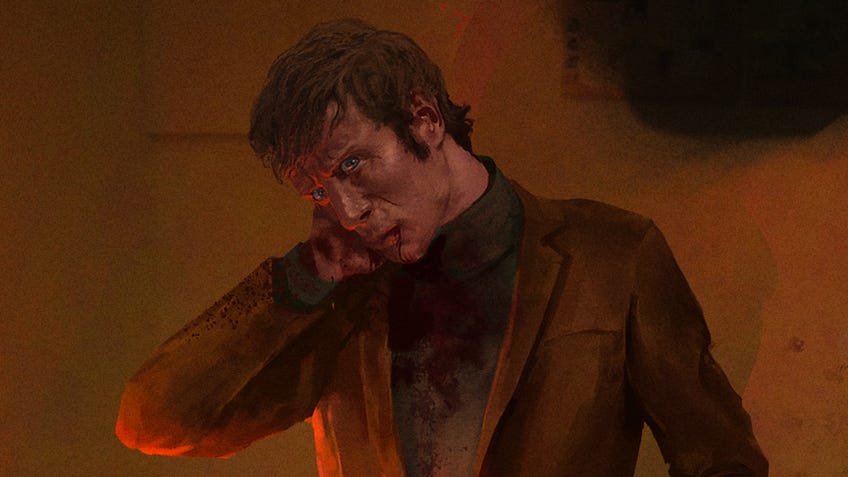How to play Vampire: The Masquerade RPG: A beginner’s guide
Sun’s down, fangs out.
Predation. Power. Manipulation. Violence. All of these things and more run through Vampire: The Masquerade like blood through a vein. If you're ready to sink your fangs into the gothic tabletop RPG, read on for our beginner's guide to how to play Vampire: The Masquerade RPG.
Vampire: The Masquerade is a tabletop RPG both intense and intimate to play, for it is a game of consequences. Delicious, dreadful consequences! In VTM, you play as supernatural beings both powerful and damaged, inextricably tied to the mortal world while cursed to never truly be part of it. Sessions play out like a high-budget TV drama crossed with a Greek tragedy, all boiled down to some basic dice-rolling and conversation.
How to play Vampire: The Masquerade RPG
- Where do I start in Vampire: The Masquerade?: Your first steps to learning how to play Vampire: The Masquerade RPG.
- What are the Vampire: The Masquerade clans?: An introduction to the vampire clans in Vampire: The Masquerade, giving you an idea of which faction your character might join.
- How do you create a Vampire: The Masquerade character?: Start creating your bloodsucking alter-ego as we take you through the basics of creating a V:TM character.
- When to roll dice in Vampire: The Masquerade RPG: Grab those ten-sided dice and find out when you'll be throwing them - and what you should hope to roll.
- How to play Vampire: The Maseruade RPG safely: Vampire: The Masquerade is a tabletop RPG with some mature and dark themes. Find out how to keep everyone at the table comfortable and safe.
If all of the above sounds appealing, you’ll be glad to know that learning how to play Vampire: The Masquerade and getting started with the tabletop RPG is an enjoyable process, too.
Where do I start in Vampire: The Masquerade?
Aside from the RPG’s core rulebook, actually playing Vampire: The Masquerade doesn’t require much more than pencil, paper and a handful of 10-sided dice, making it well suited to remote play. In order to maintain an attentive, interested group where no player has been sidelined for an hour, it’s best suited to groups of three to four player characters.
One person will take on the role of the Storyteller, akin to the dungeon master in tabletop RPGs such as Dungeons & Dragons. They will be the one who describes the world, plays the NPCs and calls for rolls. Everyone else will create a fanged monster to play as, and together you will tell a story.
As with any tabletop RPG the core of Vampire: The Masquerade is talking, but it’s fair to say that VTM is deeply social beyond this, with the shaky relationships and criss-crossing dynamics constantly pulling at players.

What are the Vampire: The Masquerade clans?
Where other tabletop RPGs might have classes, in Vampire: The Masquerade vampires are from one of a number of different bloodlines, like a mystic genealogy. Every clan has its own choice of vampiric powers (called disciplines), as well as a uniquely dreadful bane that afflicts them. This choice will also determine who your sire is (the person that turned you into a vampire), as they share your clan.
- Brujah: Fierce and passionate, Brujah burn the old for the new.
- Gangrel: Beastial loners, for Gangrel only the strong survive.
- Nosferatu: Disfigured and hidden, the Nosferatu know your secrets.
- Toreador: Glamorous artists or degenerates, Toreadors unlive for beauty.
- Malkavian: Enigmatic and disturbed, Malkavians see too much.
- Tremere: Secrets and sorcery, the Tremere know true magic.
- Ventrue: Ambition and power, Ventrue is the clan of kings.
- The Caitiff: Unwanted, adrift, Caitiff have no clan or home.
- The Thin-Blooded: half-cursed, hated, Thin-Bloods are almost, almost alive.
- Banu Haqim: Zealots and vigilantes, the Banu Haqim judge the ‘unworthy’.
- The Ministry: Spiritual and hedonistic, The Ministry are both priest and sinner.
- Lasombra: Ruthless and shadowy, the Lasombra are terrors in the dark.
For instance, you could create an environmental activist in clan Gangrel. They have Animalism, Fortitude and Protean as disciplines, letting them communicate with animals, take a savage beating and even shapeshift into beasts. But don’t forget your bane - in clan Gangrel, if you ever lose control and fall into frenzy, your animal nature manifests physically for a number of nights. Maybe you constantly smell like unwashed lion, or your tongue becomes forked and snakelike. How will you hide what you truly are, from your friends? Your family? Your children?

How do you create a Vampire: The Masquerade character?
Vampire: the Masquerade character creation is best done as a group; you can share ideas, bounce off each other and start to build relationships between characters. Think of a character concept that is exciting to you and build from there. Some questions you might ask of each other are things like:
- When were you embraced (i.e. turned into a vampire)?
- Was it someone you knew?
- Who were you when you were alive?
- Who did you know?
You can even draw a map detailing the tangled web of relationships and intrigue you’re starting to build.
With the broad strokes of your character down, you can make some important choices, such as your vampire clan and its related disciplines.
Next, work through choosing your character attributes and skills. Attributes are your foundational stats like Strength or Wits, while skills are more specific with Occult, Larceny and Brawl all being options. All of these stats will be between zero and five dots: zero being the bare minimum, five being virtuosic. Some attributes will decide your willpower, how adept you are at staving off terror and rage, while your Stamina will determine how much damage you can take before the Final Death - when you will crumble to ash and really, truly die.
Then you need what’s known as a predator type. In short, how do you get the blood you need to survive? Do you mug victims and take it by force? Feed on them while they sleep? Seduce them? There are few pleasant options.
The final elements of Vampire: The Masquerade character creation are your chronicle tenants, convictions and touchstones. Chronicle tenants are shared for all characters and NPCs; things that are accepted as being the unspoken rules of your world. They can be broken, but there will be ramifications.
Convictions and touchstones are the secret driving heart of your character, your own personal tenants. A conviction is a rule that to your character is absolutely true, and will cause issues if broken. Linking you to the mortal world are your touchstones - mortals who, to your character, represent that which is precious in this world. Every conviction has a corresponding touchstone, and anything that threatens or harms a touchstone is an attack on your vampire’s most vulnerable self. If that sounds deeply unhealthy, it absolutely is! But it’s also the only thing keeping your vampire’s dwindling humanity in check.
When to roll dice in Vampire: The Masquerade RPG
Making dice rolls in Vampire: The Masquerade is simple and fun. Most dice rolls will consist of an attribute and a skill combined. For example, a car chase might be Dexterity and Drive. The Storyteller decides which attributes and skills are most suitable, and how many successes you need to execute your plans. Any die result over five is a success; you just need enough of them to beat the number set by your Storyteller. Rolling a rattling handful of eight dice will feel powerful and confident. Rolling two dice might feel desperate.
If you don’t do well enough to succeed, you can always spend one of your precious willpower to re-roll up to three dice. This lets you immediately better your chances, at the cost of being less able to resist fear, hunger and rage.
Enter hunger. Hunger can range from zero to five: completely satisfied to dangerously ravenous. Disciplines, powers or even just waking up can cause it to rise, and it never lessens unless you feed. The only way to ever reach zero hunger is to kill your victim, so most vampires are at least a little hungry all the time. For every dot of hunger you have, you must replace one of your normal dice with a hunger die - and hunger dice are nasty.
If you ever roll a critical (two 10s) involving a hunger die, you have a messy crit. You succeed, but with obvious vampiric influence. Maybe you intimidate the guard, but do it by publicly baring your fangs. It’s a win with complications. It can get worse, however; if you make a roll with no successes and a 1 on a hunger die, it becomes a bestial failure. When this happens your inner beast bursts out and the storyteller will hit you with an immediate compulsion - something dangerous and distracting you have to deal with on top of your failure. And, just to be mean, you can never re-roll hunger dice with willpower. There’s no escape.
The final fear is falling into frenzy. When your vampire is faced with a primal threat, be it fire, sunlight, rage or hunger, there is a risk of frenzy. Rolling nothing but your remaining willpower and what humanity you have left, you roll to resist your most base urges. If you fail, you lose control of your vampire - quite literally. The Storyteller takes control and dictates what your vampire does in their darkest hour, and it will be bad. You might run through the streets, howling and covered in blood for all to see, tearing apart anyone who strays close. Once you regain control, you must reckon with whatever it is you have done.
How to play Vampire: The Maseruade RPG safely
Given how Vampire: The Masquerade is steeped in dark themes and can easily include content as intense as murder, cruelty or coersion, in order to work, all players must be safe and comfortable. This should be the baseline for playing any tabletop RPG, but Vampire: The Masquerade is so immersed in danger that it becomes that much more important to regularly ensure safety is established.
Tools such as The X Card or Lines and Veils are good starting points when used well. Having a Session Zero before you even create character and setting is strongly recommended; it’s an opportunity to have an open and respectful gathering, where players can discuss the kind of experience they want, and what is and isn’t okay to have in the game.
Safe play allows Vampire: The Masquerade, with all of its threats, politics and desperate humanity, to be a uniquely involving and enriching experience, even in a world full of monsters.



